Chapter 3: GALLIPOLI LANDING 3rd Battalion
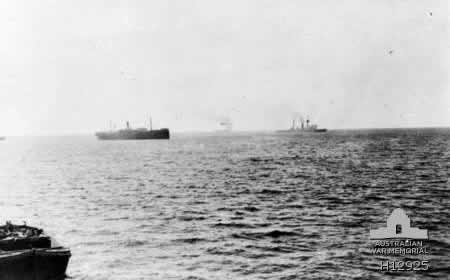 Gallipoli, Turkey. 24 April 1915. Warships and troop transports approaching the Gallipoli Peninsula. AWM
Gallipoli, Turkey. 24 April 1915. Warships and troop transports approaching the Gallipoli Peninsula. AWM
“I keyed the following from photocopies of original newspaper articles. Some of these were very hard to read and with my failing eyesight, I did the best that I could to quote these verbatim. I have left the spelling as it was written but deleted a lot of commas that did not add to or take away from the understanding of the written text. There were many of them before ‘but’ and ‘and’, so I just omitted these. Dots replace words that I could not decipher and because some of the paragraphs were very long, I broke them up for easier reading.
I am positive Bert knew about paragraphing, so this was possibly because either he was short of paper for his letters, or the publishers were trying to 'squash' them into the space available in the issue. Letters written by Perce at a much later date about Pozieres and also published in the same newspapers are recorded in Chapter 5. It is evident that the publishers had problems with some of the words. Bert was in the Landing on the 25th and according to details at the Australian War Memorial, the 3rd Bn. went ashore in the afternoon, though I was told that Bert and Vern were in the 2nd Wave in the morning. Vern stated in a report that he landed about 9am.”
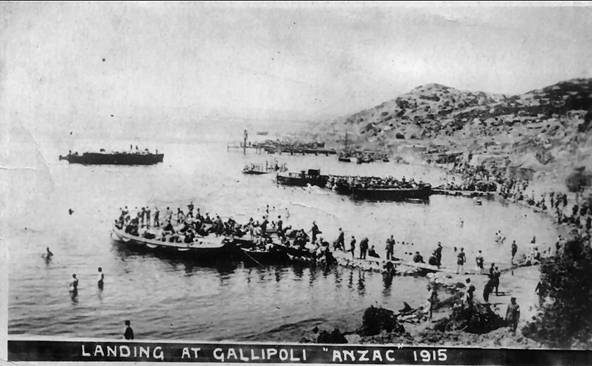
THE FIRST DAYS - BY ONE WHO WAS THERE by Herbert Andrew Smythe
LETTERS WRITTEN BY BERT SMYTHE AND PUBLISHED IN THE JERILDERIE HERALD AND URANA ADVERTISER – July 9 1915 and 16 July 1915.
THE DARDANELLES – A SOLDIER’S LETTER
The following highly interesting letter has been received from Private Bert Smythe, an old Jerilderie boy who was wounded in operations at the Dardanelles:-
THE LANDING
Half a mile from shore the troops were under shrapnel fire and many a poor chap never got off the destroyers and many more were killed in the boats both by rifle, machine gun and shrapnel fire. One boat was struck on the waterline by a concussion shrapnel and of course sank and some of the men were drowned. One chap swam ashore with the whole of his kit and rifle, though how the dickens he did it I don’t know. A couple of pontoons loaded with troops broke loose from the tow and the Turks got the machine guns on to them and killed every man in them.
Once our boys got ashore they soon rooted out all the Turks; they charged them with the bayonet. I heard that one officer, only a mere boy bagged five with his revolver. They got the Turks on the run and after a while the Turks, seeing how eager they were to charge, led them on two or three times and then raked them with machine guns and shrapnel. Consequently the Third Brigade though they did not, comparatively speaking, lose very many in the actual landing were pretty severely cut up before reinforcements were able to reach them. We landed in a bad place and it’s just as well. The Turks were expecting us at another place and had we gone there we would never have got ashore. They had guns and machine guns, splendid trenches, obstacles and even barbed wire entanglements and mines in the water to welcome us with. Where we actually did land was not very strongly guarded and we sort of surprised them, and we had got ashore and established ourselves before they could bring sufficient troops to prevent us.
Once we got ashore it was just a matter of holding on. The 3rd Brigade’s turn came about 8 a.m. and A Co. went first. I was OK until I saw the bodies of four poor beggars on the destroyer covered over with a tarpaulin. The blood was running out from under it and it quite upset me. Didn’t get my nerve back until we got into the rowing boats and then I was OK.
The shrapnel was bursting all around us at intervals but our boat escaped and landed without any casualties. When the boats got fairly close in we hopped out. I picked out a nice shallow part up to my knees but didn’t get three feet before it was almost to my waist. One of our boys stood on a stone and it rolled and he went right under. We had no opposition in landing, except for the shrapnel as the 3rd Brigade had cleared out all the beggars out from the beach. After a short rest in a ravine we pushed on. Talk about hill! we had to simply pull ourselves up by the undergrowth in places. None of them were very high but they were all very steep and we had to stop for a spell every little while. It was during one of these short spells that we had our first casualty. A bullet got Sergeant Cavill in the neck and killed him...
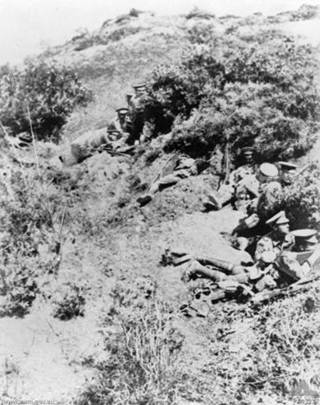 "Talk about a hill"
"Talk about a hill"The bullets from the fighting in front were flying around pretty thick. You could hear in every direction the sharp crack as they passed. Finally we got on top of the hill with a pretty good trench in it. The fact that it was a Turkish trench didn’t worry our consciences in the least. We just took possession of it and inwardly thanked the Turks for saving us the trouble of digging one. Unfortunately it had no field of fire, so we got up on to the crest of the hill and tried to pick out some of the Turks who were now potting at us both with rifles and machine guns. But we could not see a sign of them as the whole country is covered with scrub about 3ft high – ideal country for snipers and machine guns – and of course they were effectively concealed. We dug ourselves in, so that we were safe from rifle fire. It’s lovely work lying as close to the ground as a snake and trying to dig yourself a trench at the same time.
SHRAPNEL FIRE
About noon we had the artillery turned on us again and it was lovely. We had no protection against the shrapnel so we had to grin and bear it. Every few seconds a shell would burst, sometimes near us and sometimes a bit off and they kept our nerves on edge all the time. Shrapnel looks very pretty. The shell bursts up in the air and makes a pretty cloud of white smoke and when several burst near each other at the same time the effect is very striking. But when the shooting is good it is very nerve racking. The shell can be heard some distance off coming with half a scream and half hiss, culminating in a deafening report as the charge in the shell explodes and drives 300 bullets in a steep angle to the ground with great velocity. Sometimes the case of the shell is blown to pieces by the charge but more often it falls to the ground intact.
THE SNIPER
About 5 p.m. our Company Sergeant-Major MacGregor, a fine old chap, and a pal of mine, was shot dead by a sniper. The bullet hit him between the eyes. The enemy have a battalion of sharpshooters and I think they had them scattered along our front to snipe us off whenever a man exposed himself. Our scouts found one sniper in a lovely hidden trench behind and half in a bush, all the earth completely hidden and a loophole to shoot through. He had a week's provisions and 1000 rounds of ammunition with him, so he was pretty well set up, wasn’t he?
During the 4 days that I was there, there were several 3rd Battalion officers killed and wounded and when I left our colonel, Colonel Owen, was in charge of the 1st and 2nd Brigades – 8 battalions. Both our Brigadier and Brigade Major were killed. Our Brigade Major was in our trench just before he was killed. He was standing in a part of the trench labelled “Dangerous” and Major Brown remonstrated with him, telling him to come away or he’d be sniped and he said, “I’m here to be sniped at.” Ten minutes later we heard he was killed. We got practically no sleep on the Sunday night as the enemy kept up a persistent fire the whole night long and threatened us with bayonet attacks several times. Just after sunset I took some ammunition to the right where they were running out. I was warned about a bit of open ground that I had to cross so I rushed over. Luckily the beggar missed me and I got over OK. It was funny coming back. I made a rush and fell over half way but got up mighty quick I can tell you. He must have been unprepared because he did not pot at me. Next day was pretty warm work. They never gave us an instant’s peace. I was on observing nearly the whole of the time, Major Brown lending me his glasses.
TURKS CUT UP
The day before, he (Major Brown) did a good piece of work. He spotted a column of Turks in a defile so he bolted out, found a machine gun and got them to follow him till he came in view of them, then he gave the range as 1600 yards and the gun got them first shot. You ought to have seen the scatter when she started pouring bullets into them at 300 a minute, it would have done you good. You’d have died laughing. The gun cut them up pretty badly though, and it put Major Brown in a high old good humor.
FIRST GOOD VIEW OF TURKS
On the Monday morning we had our first good view of the Turks and it was not very disastrous to them either. They were crossing a ridge about 600 yards off and as soon as they appeared a heavy fire was opened on them but as they were running across us, very little damage was done. We had hardly started firing before “Cease Fire” was sounded as they were our own men. Major Brown put the glasses on them and roared out, “Fire men, fire, they are not our men, they are Turks.” It see-sawed about four times until finally just after they were proved to be Turks, they disappeared in a crevice. Major Brown was fairly ramping over it. He actually had a shot at them himself and said he bagged one. I had a shot too but without result.
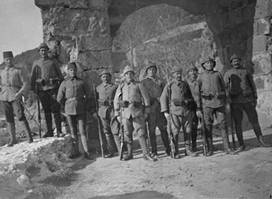 A group of veteran Turkish officers and soldiers.
A group of veteran Turkish officers and soldiers. Just about sundown we got word that the French were expected in about an hour and that everything had to be done with the bayonet, so we all got ready for a charge. Major Brown went down to the outpost trench to lead the charge but things got so hot that we had to get into the trench. They were giving us fair H__ with their shrapnel. Our artillery was quiet for some reason and I suppose the Turks thought they had better rip it in hot while they could.
NARROW SHAVES
I was crouching behind one of the boys, but when the shrapnel got bad I got in alongside him to give my head a little cover. He was wearing his haversack on his back and shortly after a concussion shrapnel came plunk into the earth just behind us taking bits off my companion's haversack with it as it passed. On striking the ground it exploded and slightly injured Major Brown in the face though he was fully five yards to the side. It had barely exploded when another came in exactly in the same place. Of course, I don’t know whether it was the first or second one that injured the Major. He temporarily lost the use of his eye and I had to lead him back after it got dark. I thought that Eibel the chap who had his haversack torn about, was badly hurt. He fell forward with such an awful groan and lay limp on me. I thought it had got him in the head. He recovered in a few minutes, however, and patted himself on the back on his providential escape. If I had remained beside him instead of getting in alongside him, it would have got me fair in the chest, and I am afraid it would have got the best of the bargain. During the morning was hit by a spent bullet. It came through the bank of earth, hit Major Brown on the shoulder, cannoned on to the side of the trench, and from there on to my back. I kept it as a souvenir and fitted it in the first shell I fired, but I lost it afterwards.
Again there was no more sleep for us during the night. I was observing practically all the time. The nights were beautiful and clear with a lovely moon. The moon had its advantages and disadvantages. It prevented the enemy getting so close that they could charge without warning and at the same time it rendered it unsafe for us to knock about outside the trenches. Next morning Major Brown went into the hospital and I reported to the next in charge and while observing for him incurred the displeasure of some or perhaps only one sniper, who potted at me consistently whenever I gave him a chance.
(Continued in the next issue of the newspaper 16 July 1915)
Whilst observing this morning picked up a couple of snipers crawling back, so I grabbed my rifle but couldn't see them without the glasses for some time. Found them at last. Both were lying still – one half behind a bush. Knocked the dust up right under one with 500 yards up. Saw the other move then so I gave them three each for luck. They were still there some time later in the morning. Was again hit by a spent bullet; only this time it was one of our own and I had a look to see if it went in, it hit so hard. As the Turks were known to use our rifles and ammunition, very likely it was fired by a Turk. I picked it up in the dirt afterwards.
The beggars will go to any length to gain their ends. Several were shot dressed in the N.Z. uniform. Some of them were very brave and actually got into our trenches and were giving orders as cool as cucumbers but they invariably got discovered and paid the penalty without any waste of time. They’d get up and order us to cease fire or perhaps to get out of the trenches and prepare to charge and all sorts of other dodges. The enemy every night used to get up to within 50 yards and even closer and you can imagine what would happen if we got out of our trenches and stood up in the bright moonlight. We were not having any, thanks!
Tuesday night was our worst night and as per usual no one got any sleep. The Turks evidently intended to attack with the bayonet along the whole front but they got such a reception on the left, where they started first, that they abandoned it. Under fearful fire from our trenches they formed up in line to charge three times and each time they were cut to pieces – mown down like hay. They were brave and by the extreme steadiness must have been trained troops. As a preparatory dose they gave us an awful time with shrapnel right up to a good while after dark on Tuesday evening. Had another very lucky escape during the afternoon. . . A concussion shrapnel landed fair on my observation post about 5 yards off and made an awful mess of it. I said to myself, “By Jingo, the next will just about land right on top of us.” And it did. Landed right in the trench fair opposite us and buried us up to our necks in dirt. I scrambled to my feet to see if I was hurt and was mighty thankful to find I wasn’t. Major Brown was the only one touched and he got his face still more marked and blood covered. He had a bandage over one eye and all the rest of his face was covered with blood from small skin wounds.
Whilst having tea a bit after dark I had to take an officer to a trench he did not know. Only expected to be away 10 minutes so I left haversack, water bottle and rifle and all behind me. While away the enemy suddenly threatened us with a bayonet charge so we all rushed to the front line. I grabbed a rifle –a broken one too – fixed the bayonet and hopped in with them. The trenches were only holes scraped in the earth. Three of us were crammed into a hole too small for one. One chap was in one end, one in the other and I lay on the side with my feet in the trench. No sleep again for any of us. We hadn’t been in position long before a chap decided to rush back for something or other. He’d hardly started before he fell moaning in a heartbreaking tone, “I’m badly wounded, oh I’m badly wounded.” The poor fellow’s cries ceased before long. He had fought and given his life!
Another chap tried to rush from the outpost trench to us and when about half way they got him low down in the stomach. The poor beggar was groaning awfully all the way. He lay in our trench and was alive next night but there was no possible hope for him. Poor beggar! Our company cook, a lettercarrier named Cox, was in a hole dug halfway to the outpost trench to repeat verbal orders. After a while they could not raise him and on investigation found that he had gone on the Unknown Journey. A sniper got him in the head. . . A chap near me the next afternoon had a very narrow squeak. A bullet went through his cap and took a bit of skin off his head. . .
We had to cross over about a hundred yards under fire to reach safety at the rear of the hill, so we rushed over. About ten yards from the safety trench I stopped to walk when I got a knock in the shoulder like the kick of a 12-inch gun. I didn’t want another and tumbled into the trench mighty quick. Got the wound dressed and was led back to the rear. I’m hanged if I know where the beggar could have been. He must have been almost under me, and the valley beneath us was full of our own boys. The bullet went in at the back of my armpit and came out near the top of my shoulder in front.
Had the good luck to see Vernie (the writer’s brother) near the Ambulance Hospital. He was OK and made me a cup of tea and it quite put me in a good humor then had to report to the ambulance and they shipped me off to hospital ship before I knew what was doing. Did not get another chance to see Vernie and haven’t heard a word since, so I am rather anxious about him. . .
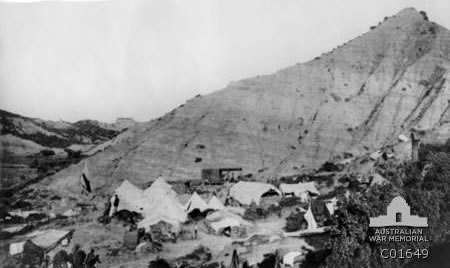 Dressing Station at Gallipoli AWM
Dressing Station at Gallipoli AWM We had no artillery on the Sunday, but our guns got going on the Monday, though to get them into position I believe that they had to blow half a hill away and build a road, and then man-handle the guns up this road . . . It would do your heart good to see the dirt fly when one of our howitzer shells landed. By Jingo they made things hum.
Had a fairly good time on the hospital ship on the way to Alexandria, but got a bad dose of fever of some sort, but am pretty right now though the fever took a lot of flesh off me. My wounds are healed externally, but can’t for the life of me lift my arm up sideways yet.
We were all in a high old humor when they told us that we were going to England. The “Ghoorka” was originally intended for an Indian hospital ship but they shoved us into her. Nearly all the medical staff were Hindoos and a very intelligent lot they were too. The doctor that looked after me was a real intelligent chap and thoroughly understood his work. We arrived at Southampton, Sunday, 16th May. They put us in a lovely hospital train. We absolutely couldn’t feel it starting and we got two meals and every attention on the way to Birmingham. You ought to see the English scenery. I don’t know what it is like in winter, but in Spring -- well words can’t describe it. It’s glorious. Lovely green fields fringed in almost every case by either beautiful hedges or trees, and small clumps of trees scattered here and there and the roads lovely and white and smooth. And complexions! Everyone, whether boy or girl, man or woman have the loveliest rosy cheeks and lips that you could imagine you’d think they were eternally blushing.
We got a great reception at Birmingham. As soon as we got off the platform there was a long line of motors waiting for us and an enormous crowd and they cheered us all a treat. It was the same all the way to the hospital. Everybody we passed waved to us and gave us a smile of welcome. It was particularly cheerful after being outside of civilisation since we left dear old Australia.
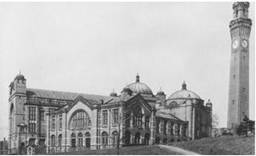 This the main Building of a University in a
This the main Building of a University in a
suburb of Birmingham
(where Bert was
probably
sent)
that became the centre piece
of the 1st
Southern Hosp. during WW1 But this hospital takes the bun. Why, it’s a blooming gaol. The things we mustn’t do that we want to do, are only exceeded by the things we must do that we don’t want to do. Practically all of us have been kept in bed though we are all able to potter round. Lights are out at 8 p.m. We have all to get up at 5 o’clock so that the beds can be made and then we have to get back into bed. There are 44 beds in this ward which is known as ‘B4’. I asked the nurse if we'd be put in the ‘after’ ward next week but she didn’t even smile. That’s the worst of these nurses. They don’t smile enough. They all get about as sober as a captured spy. I’ve been working overtime making them smile whenever they come near.* Drew absolute blanks at first, but things are improving now. Got one of them to look happy for 10 secs. It makes me feel quite desperate.
Good news! The quack has just been around and he says that I can get up, so when they bring me my gaol suit – coat and trousers of blue fleece lined material – I’ll do so. They have all my other clothes, so of course I HAVE to stay in bed. The regulations only allow us to wander in certain parts of the grounds so even our liberty outside is curtailed. As for getting out and looking over Birmingham, I believe the nurses would have a seizure if you mentioned it to them. I haven’t had a shave for a month. You ought to see me. I lost everything but what I stood up in when I was shot including my razor, etc.
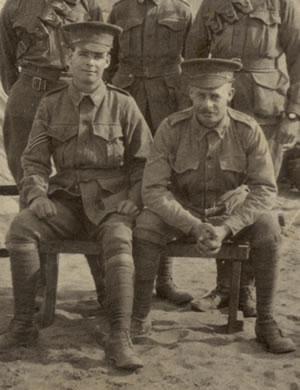 Vern and Bert in Egypt
Vern and Bert in Egypt
* This paragraph about teasing the nurses inspired a reader to pen a poem which was published in the Jerilderie Herald the following week. The full text of the poem can be found here The Nurse Without a Smile.
My grandmother had a copy of the poem and my cousins and I share a memory of a story she told us about “Bertie making chiack at a nurse.” The actual words used are "pokes borak" which is Australian slang for "banter in jest" - and Bert was certainly a joker. Making chiack is probably my grandmother's term for this jesting.
Printed in Sydney Morning Herald a month later, Monday 16 August 1915.
THE SNIPER
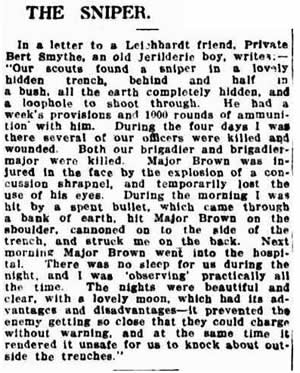 Sydney Morning Herald 16 August 1915
Sydney Morning Herald 16 August 1915 In a letter to a Leichhardt, Private Bert Smythe, and old Jerilderie boy writes:- “Our scouts found a sniper in a lovely hidden trench, behind and half in a bush, all the earth completely hidden, and a loophole to shoot through. He had a week’s provisions and 1000 rounds of ammunition with him. During the four days I was there several of our officers were killed and wounded. Both our brigadier and brigadier-major were killed. Major Brown was injured in the face by the explosion of a concussion shrapnel, and completely lost the use of his eyes. During the morning I was it by a spent bullet, which came through a bank of earth, hit Major Brown on the shoulder, cannoned on to the side of the trench, and struck me on the back. Next Morning Major Brown went to the hospital. There was no sleep for us during the night, and I was ‘observing’ practically all the time. The nights were beautiful and clear, with a lovely moon, which had its advantages and disadvantages – it prevented the enemy so close that they could have charged without warning, and at the same time it rendered it unsafe for us to knock about outside the trenches.”
NEXT >>














